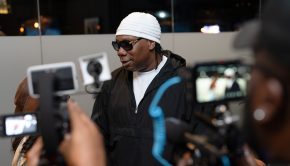Field Negro vs. House Negro: Despite their comparable skills and insight, ‘Colorism’ has elevated Kendrick Lamar above J. Cole

Equally enlightened, unequally judged. Could it be a matter of color?
This shouldn’t surprise very many of you.
Colorism or shadeism, is a form of prejudice or discrimination in which people are treated differently based on the social meanings attached to skin color.
Now, let’s get to the meat and potatoes of this thing.
Kendrick Lamar is one of Hip Hop’s finest MC’s. J. Cole is also one of rap’s elite wordsmiths.
However, as long as Cole remains on the lighter end of the color spectrum, he’ll never earn the amount of street cred or respect that Lamar’s been given by virtue of his dark skin and recollections of growing up in Compton, California.
But again, this isn’t surprising.
When light and dark slaves were divided by their masters many years ago, it caused severe emotional and psychological scarring that continues to haunt African American today.
Our community uses skin color as a means of judging beauty, intelligence, morality, and racial authenticity. In many circles throughout the black community, the darker one’s skin shade indicates a deeper affiliation with black culture and the black experience.
RELATED CONTENT: Kendrick Lamar Isn’t A Lyrical Genius, His Fans Are Obviously Too Stupid To Know Better
On the converse end, the lighter you are suggests that somehow you’re less connected to black life (due to the European blood streaming through your veins).
That brings me to Mr. Jermaine Cole — someone who is well respected within the rap community because of his willingness to dig beneath the surface and address sensitive topics that other “lyricists” generally avoid.
In his short career, Cole has used his platform to speak against police brutality, racial discrimination, and the broken family structure within the black community. Cole has also released songs that promote self-love, cultural awareness and black pride.
Nevertheless, despite his efforts, Cole is still lagging in popularity behind the increasingly worshipped Kendrick Lamar. Both lyricists appear to be socially and politically aware, but only one of them (Lamar) holds the crown of being hip-hop’s undisputed king of conscious lyricism. Why?
Some might argue that Lamar is simply a better lyricist than Cole, or that he’s more in tune with the black experience due to his beginnings in the rough streets of Compton, California. An argument could also be made that Cole often vacillates between conscious rap and party music, thereby disqualifying him from even being compared to Lamar.
These observations aren’t necessarily false (it’s really a matter if personal preference). But I would argue that from a lyrical standpoint, Cole and Lamar occupy the same space. And though he’s a college graduate as opposed to a thug or street philosopher, Cole’s view of black America should be regarded with the same amount of respect and appreciation that Lamar receives.
This doesn’t appear to be what’s happening, and I believe it’s somewhat related to Cole’s relatively fair complexion.
Colorism in hop hop has impugned the credibility and authenticity of several lyricists over the years, but two rappers that come to mind first are of course, Drake, and J. Cole.
As a half-Jewish native of Canada, Drake has wisely refrained from discussing topics related to the black experience (even though he is no less of a Negro than his darker contemporaries).
Cole’s music radiates with militancy and race pride — it always has. However, perhaps on a subconscious level, the rap community puts more faith in what Kendrick has to say than Cole. As a result, both rappers have been preaching the same messages, but only one (Lamar) is becoming a cultural icon.
TweetSummary:






























